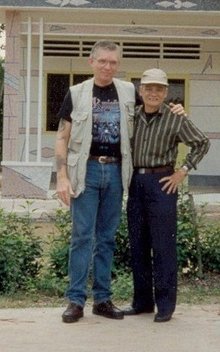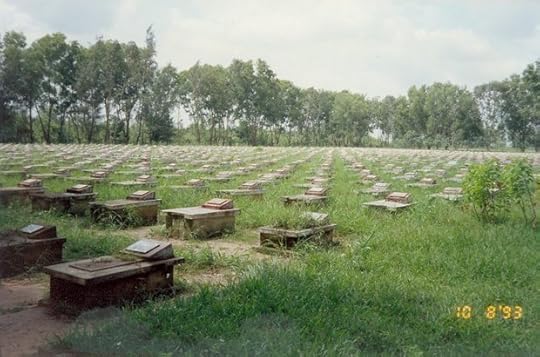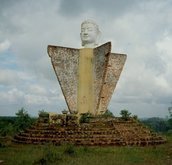Without attachment

I thought about calling this blog “closure,” until it came
to me that most people equate closure with “the end,” and I realized that there
is no end to what I’m writing about but there is a point where one can, and
must sever attachments. That’s what I’m
writing about; the end of attachment and why that is so important.
In February 1991, Operation Desert Shield became Operation
Desert Storm. One of the little noted
events that followed that action was Vietnam Veterans overrunning VA Hospitals –
not in protest but as patients – patients suffering from PTSD.
I didn’t check into a VA hospital, though it crossed my
mind. Instead, I ran an ad in my local
newspaper. The ad read, “I served in
Vietnam. If you were there and would
like to talk about it meet me at the Best Western…” and I gave the date and
time. That ad led to the founding of
Vietnam Veterans Southern Command.
Almost from the beginning, a main topic at Southern Command
was returning to Vietnam. As the
conversation became more serious, six of us decided we would do it. We set a date and began making plans. As
various deadlines drew nearer - passport applications, ticket deposits, tour
scheduling, etc. - the number committed to the trip grew smaller.
When the Thai Airways flight left LA, in early October,
1993, I was the only member of Southern Command on board. I was glad to be alone in a way that I’m not
sure I can describe, but I’ll take a shot at it.
For almost two years, I’d spent a lot of time talking about Vietnam, my
involvement there, and how it had affected me.
That followed almost thirty years of not talking about it at all. Since I had never talked about it, I wondered if,
after my long silence, I was just making up a story about the Vietnam War’s
place in my life. I was going back to find
out and if it did turn out to be a lie, I didn’t want anyone around to see my reaction. That’s why I was glad to
be alone.
I spent a sleepless night in Bangkok before boarding the
flight for Saigon (I know it’s Ho Chi Minh City to most people – I’m just not
one of them). We barely hit cruising
altitude before we began our decent into Saigon. Our final approach was long and low. As we passed over miles and miles of rice
paddies I had an overwhelming feeling that I was finally coming home. Before the wheels touched the runway at Tan
Son Nhut Airport all self-doubt slipped away; I knew that Vietnam was the most
real story in my life.
I had arranged for a tour guide/translator and a military
guide. I had high hopes of getting
inside Camp Bearcat, my home for the sixteen months I served in Vietnam. That’s why I was accompanied by General Diem,
a certified military guide, and former four-star Viet Cong General. I watched General Diem talk to the guards at
the camp, and then their commanding officer, and finally the commanding officer
of the entire base, which is a training facility for the Army. In spite of his intense effort on my behalf,
I didn’t get through the gate.
However, General Diem took me to other places and taught me
things that were far more important than revisiting Camp Bearcat. First he took me to his veteran’s group –
Vietnam Veterans of Saigon – where I was sworn in as a full-fledged member (at
the first meeting of Vietnam Veterans Southern Command, after the trip, I told
everyone about General Diem, and we voted him into our group). On my third day in Vietnam, my guide and
General Diem took me to Chu Chi. Chu Chi
was the first home of the Twenty-Fifth Infantry Division in Vietnam.
Chu Chi was a poor location for the Twenty-Fifth, because it
was centered over a Viet Cong underground facility that in places operated on
four levels. The VC compound at Chu Chi
had existed since their war with France and at times had housed as many as
25,000 troops.
When we figured out that the VC we were fighting lived under
one of our major headquarters, the Twenty-fifth moved to Camp Bearcat and the
Viet Cong headquarters at Chu Chi was blanket bombed by B-52s of the Strategic
Air Command, based in Bangkok.
Thousands of Viet Cong died and their bodies remained entombed until the
war ended. Then, in spite of being
almost bankrupt as a result of the war and subsequent economic embargo, the
Vietnamese Government found the funds to excavate the ruins at Chu Chi and
recover, identify, and bury with honor, all those who died there.

General Diem and I stood in silence, on the edge of that
huge memorial cemetery. When I was able
to speak, I managed to ask him, through our guide/translator, why the government
undertook such a monumental task. He
turned to me, and in very broken English, which I understood perfectly, said, “War
is not over until everyone is accounted for.”
I think about General Diem often. He is probably the most unassuming, impersonal,
yet compassionate man I’ve ever met. And,
in spite of his small stature, he is one of the most powerful. General Diem has accounted for everyone and
everything that matters in his life - that means he is no longer attached to or run by things that happened in the past. Until we account for each of those things in our life, they run us. We're kidding ourselves to believe otherwise.

I'd love it if you'd take a minute and visit my web site
then stroll over to my other blog



